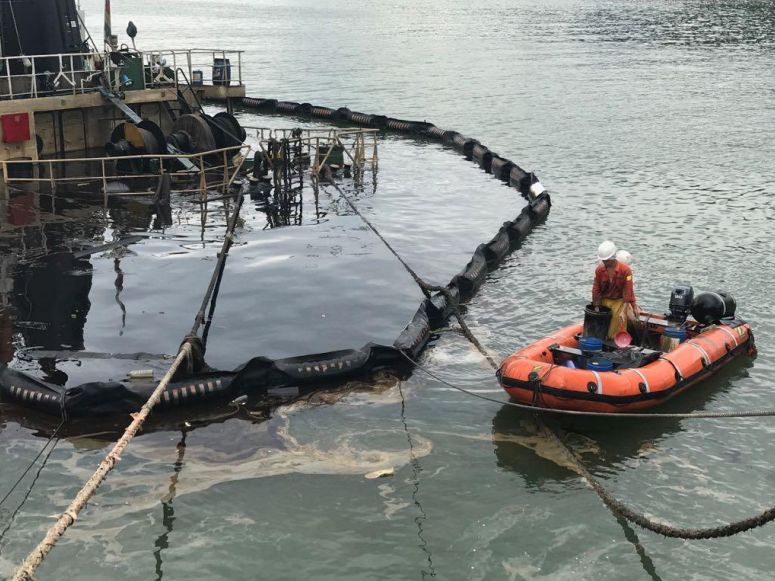Concerned citizens have slammed government efforts to clean up oil and prevent further leaks from a boat that ran aground near Discovery Bay during Typhoon Hato last month.
The 2,000-tonne cargo vessel ran aground when Hato hit Hong Kong on August 23. After three weeks, the ship, Yuhai 1, now lies partially submerged across from Nim Shue Wan beach, close to apartment buildings. It was carrying 50 tonnes of marine fuel and gas oil, and still has some of it on board.
The Marine Department told HKFP that the vessel’s owner had appointed its Protection and Indemnity Club – a mutual maritime insurance provider – to arrange for the wreck’s salvage.

A contractor hired by the club is conducting the clean-up. They have put oil booms around the ship to contain the leak. The Marine Department said that a few oil sheens were recently found near the vessel, but they are being contained by the oil booms and “the condition is now under control.”
However oil could be seen floating on the surface a few metres outside the boom on Tuesday. Residents have questioned the methods employed to clean up the spill and urged the government to speed up efforts to salvage the ship, to prevent further environmental damage.

Linda Barnes, who has witnessed some of the clean-up action from her flat, told HKFP that the process seemed to be “a saga of inefficiency and delays.” She said that the ship sunk gradually over several days after the storm, and an oil boom was put around it on August 27. Then, on the first weekend of September, a crew could be seen working on the vessel through the night, but dark fuel surrounding the boat was visible the next day, and could be seen leaking out of the oil booms into the bay.

Local resident Jessica Hickling also captured a video on September 6 of workers using brooms, dustpans and buckets to siphon oil from inside the containment – a method some residents questioned for its apparent inefficiency.
Slow response
District Councillor Amy Fung told HKFP that she thought the parties involved had not acted in time when the ship ran aground during the typhoon.
“They acted very slowly. When the typhoon came, they didn’t think about how they were going to get the boat back out – it had not sunk by that time – or what they were going to do with it. Until the ship sank and the oil leaked out – now they’ve put up booms but the Marine Department’s boat is nearby and it’s not doing anything.”
“The shipowner and the insurance company are not sensitive enough [about environmental damage],” she said.

“You know that it could be a disaster, so you should carry out risk management – as soon as there’s an incident, you should anticipate that it would run aground, sink, or pollute the environment. You should plan a series of actions to mitigate the situation… but they obviously didn’t do that.”
She said that some residents were also angry about the smell of fuel that lingered in the ship’s vicinity, even over the past weekend, worrying that it would harm their health.
Hickling said she was concerned about the leaked fuel’s effect on “water quality, and the knock-on effect of the local marine life. People in the community here and on Peng Chau, they fish and then they eat the local fish – that cannot be healthy.”

The Marine Department told HKFP it has been liaising with the insurance provider all along, and that it will continue to do so in order to facilitate the salvage operation.
Akasha Barickman, who works in education and lives on Hong Kong Island but is part of the sailing community, called on the government to improve its practices to speed up clean-up efforts and streamline communication in order to minimise damage in future oil spills and other toxic incidents.
“There seems to be a lack of coordinated effort between government departments to minimise environmental impact,” he said.

He questioned the government’s policy of allowing the clean-up and salvaging to proceed at the shipowner’s own rate, rather than using speedier methods to minimise environmental damage.
“Whether or not it is true, it can appear that government departments are protecting economic interests more than the environment,” he said.
